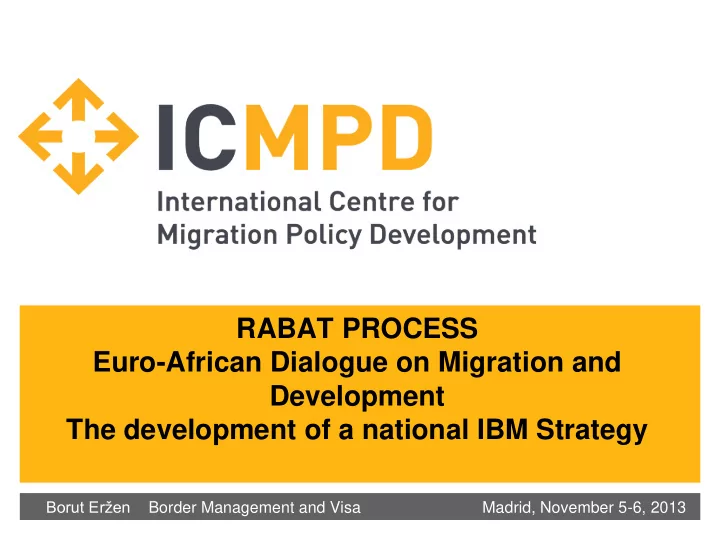

RABAT PROCESS Euro-African Dialogue on Migration and Development The development of a national IBM Strategy Borut Eržen Border Management and Visa Madrid, November 5-6, 2013
EU IBM Guidance and Standards Borut Eržen Border Management and Visa Madrid, November 5-6, 2013 1
Some IBM benefits • Simplified and harmonised procedures (no duplication of efforts) • More effective use of resources, overall and easier planning • Faster processing of people and goods • More effective detection of people traffickers and smugglers, terrorists and other criminals • Faster and improved sharing of information • Faster response to emergencies and threats • Better border management overview for the government Borut Eržen Border Management and Visa Madrid, November 5-6, 2013 2
Developing a national IBM strategy • Political will, appointment of a coordinator • Creation of an inter-agency working group • Decision-making body • Implementing body • Involvement of all border management agencies • Long-term perspective • Thorough assessment of the current border management situation (gaps & needs analysis) – see self-assessment grid (IBM GL, 2010) • Inventory of all ongoing and planned border management activities in the country Borut Eržen Border Management and Visa Madrid, November 5-6, 2013 3
Key steps for developing the IBM strategy • Identification of a national coordinator • Identification of and contact with key stakeholders • Establishment of the coordinating bodies (high-level decision-making body and implementing body) with clear Terms of Reference • Definition of the main objectives • Analysis of the current situation (gaps & needs analysis) • Drafting of individual strategy chapters • Circulation of the draft strategy paper for input from all stakeholders • Preparation of the final strategy document • Adoption of the strategy at the highest level Borut Eržen Border Management and Visa Madrid, November 5-6, 2013 4
The process of developing and implementing the IBM Strategy and Action plan Borut Eržen Border Management and Visa Madrid, November 5-6, 2013 5
How is IBM implemented? To set up an IBM System, it is required to: • Plan and coordinate actions at the higher level • Involve all relevant stakeholders • Address issues in a multidisciplinary and unified manner To do so: • IBM Strategy and Action Plan must be developed... • ...with the help of a Inter-agency Working Group Borut Eržen Border Management and Visa Madrid, November 5-6, 2013 6
The IBM Planning Documents The National IBM Strategy shall: • On the basis of a comprehensive Gaps & Needs Analysis ( or self-assessment grid ) • List clear OBJECTIVES leading to better intra-service, inter-agency and international cooperation The National IBM Action Plan: • “ Translates ” each objective of the IBM Strategy into ACTIVITIES , incl. human resources, budget, timelines... Borut Eržen Border Management and Visa Madrid, November 5-6, 2013 7
IBM inter-agency working group • Address problems in a multidisciplinary way • Identify overlaps or omissions • Help reduce divisions between different areas of work • Foster joint decision-making • Ensure coherence in the work carried out by the different agencies • Conduct better resource planning and make optimal use of expertise/competence of each agency involved • Set clear strategic and operational objectives in the areas requiring adjustments Borut Eržen Border Management and Visa Madrid, November 5-6, 2013 8
ToR for an IBM Inter-Agency Working Group Borut Eržen Border Management and Visa Madrid, November 5-6, 2013 9
Possible obstacles • Lack of trust • Lack of political/high level support • Time-consuming revision of legislation for effective cooperation (overlaps, loopholes, unclear responsibilities) • Non- or weak cooperation from stakeholders • Different agencies are at different stages of technological development Borut Eržen Border Management and Visa Madrid, November 5-6, 2013 10
Questions?
Thank you very much for your attention!
Borut Er žen Programme Manager Gonzagagasse 1, 5th floor 1010 Vienna Phone: +43 1 504 46 77 23 57 Austria Fax: +43 1 504 46 77 23 75 www.icmpd.org E-mail: ICMPD@icmpd.org
Recommend
More recommend